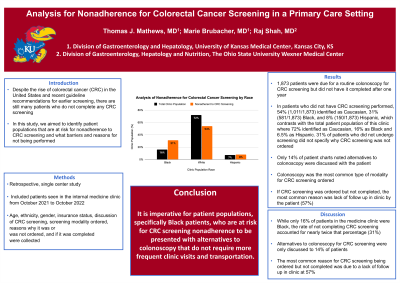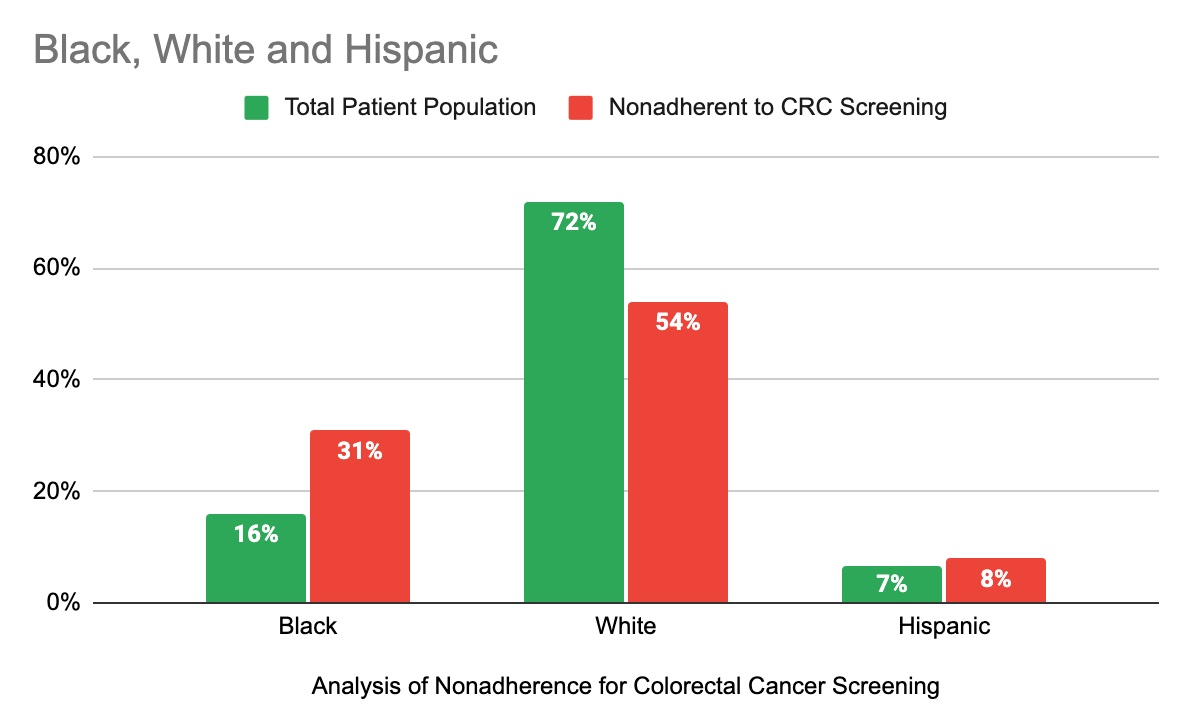Monday Poster Session
Category: Colorectal Cancer Prevention
P2127 - Analysis for Nonadherence for Colorectal Cancer Screening in a Primary Care Setting
Monday, October 28, 2024
10:30 AM - 4:00 PM ET
Location: Exhibit Hall E

Has Audio
- TM
Thomas J. Mathews, MD
University of Kansas Medical Center
Kansas City, MO
Presenting Author(s)
Thomas J.. Mathews, MD1, Marie Brubacher, MD2, Raj Shah, MD3
1University of Kansas Medical Center, Kansas City, MO; 2University of Kansas Medical Center, Kansas City, KS; 3The Ohio State University Wexner Medical Center, Columbus, OH
Introduction: Despite the rise of colorectal cancer (CRC) in the United States and recent guideline recommendations for earlier screening, there are still many patients who do not complete any CRC screening. In this study, we aimed to identify patient populations that are at risk for nonadherence to CRC screening and what barriers and reasons for not being performed.
Methods: A retrospective study was performed in patients seen in the internal medicine clinic from October 2021 to October 2022. Age, ethnicity, gender, insurance status, discussion of CRC screening, screening modality ordered, reasons why it was or was not ordered, and if it was completed were collected.
Results: 1,873 patients were due for a routine colonoscopy for CRC screening but did not have it completed after one year. Regarding patients who did not have CRC screening performed, 54% (1,011/1,873) identified as Caucasian, 31% (581/1,873) Black, and 8% (150/1,873) Hispanic, which contrasts with the total patient population of this clinic where 72% identified as Caucasian, 16% as Black and 6.5% as Hispanic. 31% of patients who did not undergo screening did not specify why CRC screening was not ordered. Only 14% of patient charts noted alternatives to colonoscopy were discussed with the patient. Colonoscopy was the most common type of modality for CRC screening ordered. If CRC screening was ordered but not completed, the most common reason was lack of follow up in clinic by the patient (57%).
Discussion: While only 16% of patients in the medicine clinic were Black, the rate of not completing CRC screening accounted for nearly twice that percentage (31%). Alternatives to colonoscopy for CRC screening were only discussed to 14% of patients. The most common reason for CRC screening being ordered but not completed was due to a lack of follow up in clinic at 57%. It is imperative for patient populations, specifically Black patients, who are at risk for CRC screening nonadherence to be presented with alternatives to colonoscopy that does not require more frequent clinic visits and transportation.

Disclosures:
Thomas J.. Mathews, MD1, Marie Brubacher, MD2, Raj Shah, MD3. P2127 - Analysis for Nonadherence for Colorectal Cancer Screening in a Primary Care Setting, ACG 2024 Annual Scientific Meeting Abstracts. Philadelphia, PA: American College of Gastroenterology.
1University of Kansas Medical Center, Kansas City, MO; 2University of Kansas Medical Center, Kansas City, KS; 3The Ohio State University Wexner Medical Center, Columbus, OH
Introduction: Despite the rise of colorectal cancer (CRC) in the United States and recent guideline recommendations for earlier screening, there are still many patients who do not complete any CRC screening. In this study, we aimed to identify patient populations that are at risk for nonadherence to CRC screening and what barriers and reasons for not being performed.
Methods: A retrospective study was performed in patients seen in the internal medicine clinic from October 2021 to October 2022. Age, ethnicity, gender, insurance status, discussion of CRC screening, screening modality ordered, reasons why it was or was not ordered, and if it was completed were collected.
Results: 1,873 patients were due for a routine colonoscopy for CRC screening but did not have it completed after one year. Regarding patients who did not have CRC screening performed, 54% (1,011/1,873) identified as Caucasian, 31% (581/1,873) Black, and 8% (150/1,873) Hispanic, which contrasts with the total patient population of this clinic where 72% identified as Caucasian, 16% as Black and 6.5% as Hispanic. 31% of patients who did not undergo screening did not specify why CRC screening was not ordered. Only 14% of patient charts noted alternatives to colonoscopy were discussed with the patient. Colonoscopy was the most common type of modality for CRC screening ordered. If CRC screening was ordered but not completed, the most common reason was lack of follow up in clinic by the patient (57%).
Discussion: While only 16% of patients in the medicine clinic were Black, the rate of not completing CRC screening accounted for nearly twice that percentage (31%). Alternatives to colonoscopy for CRC screening were only discussed to 14% of patients. The most common reason for CRC screening being ordered but not completed was due to a lack of follow up in clinic at 57%. It is imperative for patient populations, specifically Black patients, who are at risk for CRC screening nonadherence to be presented with alternatives to colonoscopy that does not require more frequent clinic visits and transportation.

Figure: Analysis of Nonadherence to Colorectal Cancer Screening
Disclosures:
Thomas Mathews indicated no relevant financial relationships.
Marie Brubacher indicated no relevant financial relationships.
Raj Shah indicated no relevant financial relationships.
Thomas J.. Mathews, MD1, Marie Brubacher, MD2, Raj Shah, MD3. P2127 - Analysis for Nonadherence for Colorectal Cancer Screening in a Primary Care Setting, ACG 2024 Annual Scientific Meeting Abstracts. Philadelphia, PA: American College of Gastroenterology.
